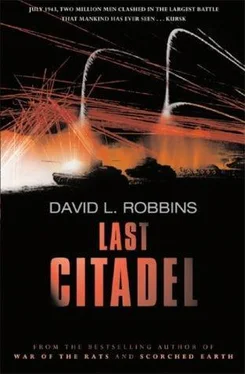In another hour, the southern horizon flared scarlet. The dark flowed back in, but another jittery dome was bitten out of the night. Dimitri watched and the flashes increased, a fever.
From far off came the thumps, the gavel of war, the commencing.
July 3
1240 hours
Oktabrskaya train station
The beat of pickaxes and sledges lulled Luis. His passenger car sweltered. His train had been stopped since last night at the ruined Oktabrskaya station. The brick station house had no roof left, just scored beams, and all its sills were marred with black brows of soot from the fire. The Red night bombers had done nice work. The garrison billeted at Oktabrskaya would be without quarters for a while. But more vexing, the rails were broken in several places. Luis and Major Grimm sat as they had all morning, staring out their dripping windows at a dreary drizzle, waiting for repairs to be effected.
The major sweated profusely An hour ago he’d begged Luis’s pardon and stripped down to his white blouse. Luis watched him mop his head repeatedly. Porters ferried water to the major but there was no ice left on the train to cool it for him. Luis did not undo the first button of his SS uniform; his body had so little excess on it that he pitied the corpulent officer melting in the seat across from him. The two had spoken very little since the major came to sit down. Luis took long, languorous blinks, wishing to nap in the heat. But the major would not sit still and rustled the fabric of his seat every few minutes.
‘Perhaps a walk in the rain,’ Luis suggested.
‘No. I don’t want to climb back into that damn coat.’ The major held up his soaked hanky. ‘This is my first time in Russia. I thought it was supposed to be cold.’
‘I think, Major, Russia is only supposed to be inhospitable.’
Major Grimm nodded and smiled, wiping sweat from his upper lip. The look on his face seemed an appreciation of the man who made this jest, one who’d bled a part of his life away into the Russian soil.
‘I think I will put you in for a medal.’ The major spoke under the dabbing kerchief. ‘You’re very clever, you know. Your preparations saved those tanks. And the way you handled those partisan scum.’ The major pretended a shudder.
Luis had waited all morning for this statement from the officer. But Major Grimm had slept late, peeping out of his compartment only when the lunch trays were brought around. Luis contained his smile; this was the first step in the vision he held of his return to Russia and warfare. He would cover himself in medals and distinction on the Eastern Front, and go home to Barcelona as blinding to the eye as the sequins on his father’s golden traje de luces .
‘Thank you, Major.’
The officer leaned forward to pat Luis’s knee, the puffed hand silly on his puny leg. ‘You deserve it, Captain.’
Luis waited a moment while the major toweled himself. Then he stood, taking his leave to inspect the tanks, the men, and the progress of the repairs. He needed to do none of these. He simply knew it was a good moment to walk away. When the bull is down, walk the ring once, then stride away under the applause. Luis had gotten what he’d wanted from this officer. He’d made sure the man saw everything he did last night, held back the surprises of his tactics the way a matador hides the sword beneath the cape. Luis kept concealed until the right moment the tarp-covered machine-guns, his signals to the train’s engineer, his orders to the company of grenadiers. He could have sent someone else up the tracks to locate the explosive on the rails but he went himself. Knifing the last partisan was an inspired stroke. The major was enamored of Luis Ruiz de Vega, la Daga , the white Spanish blade.
He stepped off the train into the sultry summer sprinkle. Luis drew himself up and let others notice him, the painfully thin SS man, unmindful of the rain, the one who’d put down the partisan; yes, they were talking. Moving only his eyes he caught someone point him out. Luis had been comfortable under the gaze of thousands in the plaza de toros , just the way he was accustomed to the feel of blood on his hands. Walking these tracks in damp Russia was nothing as far as performances went.
Fifty meters in front of the locomotive, new rails were being laid by gangs of workers. The old, bent rails lay aside like giant tusks. The laborers were local Russians pressed into service by the occupation force, guarded by soldiers with machine pistols.
Luis approached a sergeant.
‘ Schneller!’ he said. Faster.
The sergeant took a step forward and struck one of the workers with the butt of his gun. This worker – elderly like the rest of them, there was little but dregs left of Russian manhood in the towns, all the youth were gone to fighting – crumpled under the blow. Luis watched the man wobble to his feet without help, the other Russians along the rails kept their heads down. He did not see an appreciable increase in the rate of work, but the sergeant seemed satisfied and stood back. Luis did not watch. He’d made his appearance and his point. Again he wondered at the German mind, the strange calculation that striking a human was the best way to make him obey. Perhaps this worked in Russia. It would not, he thought, work so well in Spain. The bull just gets angrier the more it is stabbed. When this war is over, he intended to be one of the men who saw to it the Germans took a more civil approach in his country.
When he returned to his passenger car, the rain had not slacked. The major receded into his compartment and Luis was able to sit alone. He ate a bit of bread and cheese, always surprised by how quickly he felt full. More than half of what had been brought to him remained on the tray. He tossed the rest out the window and left the empty set of plates in front of him. When the porter came to clear them he gave Luis an approving wink. Luis closed his eyes and listened to the Russians work, the clink of hammers and spikes. The rain had washed away some of the day’s close heat. He slept, and did not awaken until the train lurched into the gray dim afternoon.
July 3
1845 hours
Belgorod station
At Belgorod, Luis’s mission dissolved around him. The rain stopped, too.
The company of grenadiers filed from the train and was met by its new captain. They marched away. The locomotive uncoupled and chugged off on a different line to lug another train back to the west. Major Grimm disappeared and did not say goodbye. Luis was not greeted by anyone, though the station bustled with people in uniform. No one came to congratulate him for arriving with the Tigers safely. He felt deserving of attention but was unnoticed.
The train yard was large and not ruined at all by bombs. He stood on the platform waiting, making himself easy to find should someone be looking for him with new orders and a pat on the back. He gazed over the skyline of the small city. Onion domes, crosses on spires, and water towers were visible against the overcast sky. Solid brick buildings without adornment made the character of the town humble and strong, Luis sensed it was very Catholic, and he liked Belgorod at the end of his long journey back into Russia. He thought this boded well for him. He cheered up and walked to the rear of the train to supervise the off-loading of the ten Mark VI Tigers, and the change from their narrow transport tracks to their wider combat treads.
He knew this work to be back-breaking; he’d watched the tan-colored Tigers loaded onto the train in Germany, and now the process had to be reversed. Crews of mechanics from Leibstandarte clustered around the tanks on their flatbeds, local rail operators assisted by uncoupling the cars one at a time. One mechanic lifted himself into the driver’s hatch of the Tiger at the end of the train. He cranked the engine, black exhaust spat from the pipes, and the thing roared and shook the whole flatbed car, so powerful was it even in starting. Others scrambled to lay reinforced ramps at the end of the car; somewhere deep in the Tiger’s guts the transmission clanked and the tank shuddered. It was like watching a behemoth come alive. The sprocketed wheels began to turn, the treads squealed, the flatbed flexed under the rolling weight, and the tank kicked forward with a cloud of smoke and metallic whines. Men stood back while the tank crept ahead toward the ramps, afraid the giant might stumble and fall on them. They stood admiring, heartened. Luis felt even better, because he’d brought the Tigers here to Russia, he had saved them from the partisans.
Читать дальше












